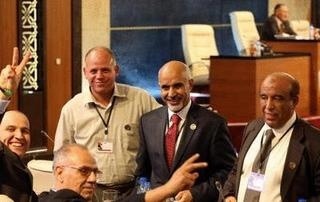by Imed Lamloum – TRIPOLI (AFP)
The head of Libya’s newly-empowered national assembly Mohamed al-Megaryef pledged on Friday to remain neutral and seek to unite ranks in the country, where post-revolution divisions are still deep.
“My main duty is to stand aside, away from political, regional and tribal considerations,” Megaryef said as he presided over the first official meeting of the General National Congress.
Speaking just a day after he was elected head of the 200-seat assembly, Megaryef, who is seen as pro-Islamist, announced that he will quit as president of the Libyan National Salvation Front.
Megaryef, a veteran opponent of slain Libyan strongman Moamer Kadhafi’s ousted regime, defeated liberal independent Ali Zidane in a run-off by 113 votes to 85.
He said he will keep an “equal distance” with all members of the assembly and called for a broad national dialogue involving politicians and members of civil society, including those outside the legislative body.
He also underlined the need to “remain close to the people” and suggested that all meetings of the assembly be broadcast live on Libyan television.
“Of course there will be differences of opinion. But we must exchange views in order to reach common agreement for the supreme interest of the nation,” he said.
“The Congress has a huge and important responsibility,” said Megaryef, adding that Libya was at an “important and dangerous” crossroad in its history.
Thursday’s vote in the assembly, elected in landmark polls on July 7, came after the National Transitional Council handed over power on Wednesday, in a symbolic move marking the first peaceful transition in Libya’s modern history after four decades of Kadhafi’s iron-fisted rule.
The assembly is tasked with choosing an interim government that will steer the country until fresh elections can be held under a new constitution to be drafted by a panel of 60 members.
Its new president is an economist with a doctorate from Britain, who held leading posts in the Kadhafi regime in the 1970s before defecting in 1980 to join the opposition in exile.
He was a founding member of the Salvation Front, which grouped exiled opponents of Kadhafi.
Hounded by Kadhafi’s intelligence service, Megaryef survived assassination attempts in Rome in 1981, in Casablanca in 1984 and in Madrid in 1985, his daughter Asma said.
The Kadhafi regime also took reprisals against family members who stayed in Libya, jailing several of his brothers.
Regarded as a moderate Islamist close to the Muslim Brotherhood, Megaryef was elected to the assembly on the ticket of his former exiled grouping, now renamed the National Front Party.
A member of the Brotherhood’s Justice and Construction Party (JCP), who asked not to be identified, said Megaryef’s election was “a victory for the Islamists.”
Megaryef was born in 1940 in Libya’s second city Benghazi, which was the cradle of last year’s uprising but many of whose residents have complained their role has not been sufficiently rewarded in the post-Kadhafi Libya.
The assembly also elected two vice presidents: Jommaa Atiga, an independent from Libya’s third-largest city Misrata, and JCP candidate Salah al-Makhzoum.
Under the interim constitution, decisions in the assembly require a two-thirds majority to pass, making cooperation necessary to avoid gridlock in the delicate transition.
The majority of the assembly’s 200 seats were set aside for independent candidates, many of whose loyalties and ideologies remain unclear but who are being wooed by various blocs.
Political parties were allowed to contest just 80 of the seats.
The liberal National Forces Alliance of Mahmud Jibril, who served as premier during last year’s conflict, won 39 on its own. It can also count on the support of a centrist party led by Ali Tarhuni, who held several key posts during last year’s revolt, and which won two seats.
The JCP took 17 seats but its leader, Mohammed Sawan, has said it can match the support of Jibril’s party in the assembly with the backing of independents.
.







